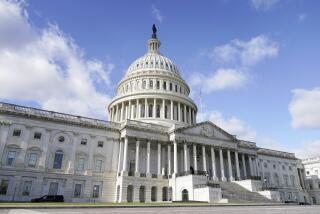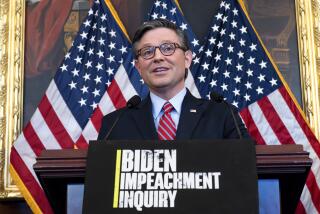Republican rifts mean more gridlock, obstacles for Obama
WASHINGTON — In the days immediately after President Obama’s reelection victory, White House officials hoped that in a second term he might have better relations with congressional Republicans. The “fever will break,” more than one Obama aide forecast.
The last several days have demonstrated the opposite. Washington remains caught in a partisan stalemate on the budget, seems headed toward another on gun control and perhaps one on immigration policy as well.
That gridlock could inflict significant damage to the Republican Party. But Obama’s ability to manage an ambitious agenda in his new term also hangs in the balance.
Stalemates in Congress “may not affect his popularity all that much, but it will affect his ability to govern, if you define ability to govern as your ability to move your policy agenda forward,” said Bill Galston, a former domestic policy advisor to President Clinton.
For Republicans, the events of the last several days signal how the orthodoxy of the tea party and other conservatives dominates the party, much to the frustration of the few remaining moderates, who want to broaden the GOP’s appeal.
“We’re on the wrong side of fixing the economy and on the wrong side of where the country is going in dealing with gun violence and on comprehensive immigration reform,” said John Weaver, who advised Jon Huntsman Jr.’s campaign for the 2012 Republican presidential nomination and helped oversee 2008 GOP nominee John McCain’s presidential run.
“At this rate, we’re going to be able to put the entire party on a Carnival cruise ship and sail around the Caribbean,” he said.
Economists have said that the U.S. could slip back into recession unless Washington acts to prevent across-the-board tax increases and spending cuts due to take effect at the start of the new year. If that happens, polls show, the public is more likely to blame Republican lawmakers rather than the president.
An ABC News/Washington Post poll last week showed Americans trusted Obama over congressional Republicans when it came to protecting the interests of the middle class by 58% to 32%.
In the same poll, 53% of respondents agreed with the statement that the GOP “is too conservative and needs a program concerned more directly with the welfare of the people,” compared with 38% who agreed that “the policies of the Republican Party are good, but the party needs a better leader to explain and win support for these policies.”
Within the GOP ranks, however, the view is quite different. By 64% to 23%, people who identified themselves as Republicans said the party’s problem was one of leadership, not policy. That’s particularly true among conservative Republicans, 73% of whom say the party’s problem is leadership.
That helps explain, in part, what happened Thursday night in Congress, when House Speaker John A. Boehner (R-Ohio) realized he did not have the votes in his caucus to pass any sort of tax increase, even one that mainly hit households with incomes above $1 million.
To some degree, Obama’s difficulties in striking a budget deal with congressional Republicans are a reflection of the reality of his political position: He leads a nation that remains both deeply polarized and closely divided, as it has been for many years. He won reelection by only half the margin of his 2008 victory and with very limited coattails; the returning Republican majority in the House was barely dented by losses at the polls.
Of the GOP members in the incoming House, 219 come from districts carried by Mitt Romney, according to a Cook Political Report calculation. Add nine Democrats from districts carried by Romney, and a clear majority of the 435-member House hails from places where Obama lost.
A Republican strategist, who wouldn’t be quoted by name to avoid alienating clients, said the party finds itself in a situation where actions that make sense for lawmakers individually can harm the party’s long-term prospects.
Many of the party’s lawmakers worry more about potential challengers in a GOP primary than they do about pressure from the White House, the strategist said. There were barely veiled threats, in advance of the possible House vote on the tax hike, that Republicans who supported Boehner’s plan might face primary opposition from the right.
“A lot of Republicans have even rejected the very word ‘compromise.’ It’s an attitude that appeals to the Republican base but isn’t necessarily good for appealing to the general electorate,” said John J. Pitney Jr., a Claremont McKenna College professor of government and former Republican policy aide in Washington.
On top of that, he said, there’s now “a real possibility that Republicans could end up with the worst of all possible worlds: a tax increase and blame for the tax increase” as a result of Boehner’s inability to get support from fellow Republicans.
More to Read
Start your day right
Sign up for Essential California for news, features and recommendations from the L.A. Times and beyond in your inbox six days a week.
You may occasionally receive promotional content from the Los Angeles Times.







